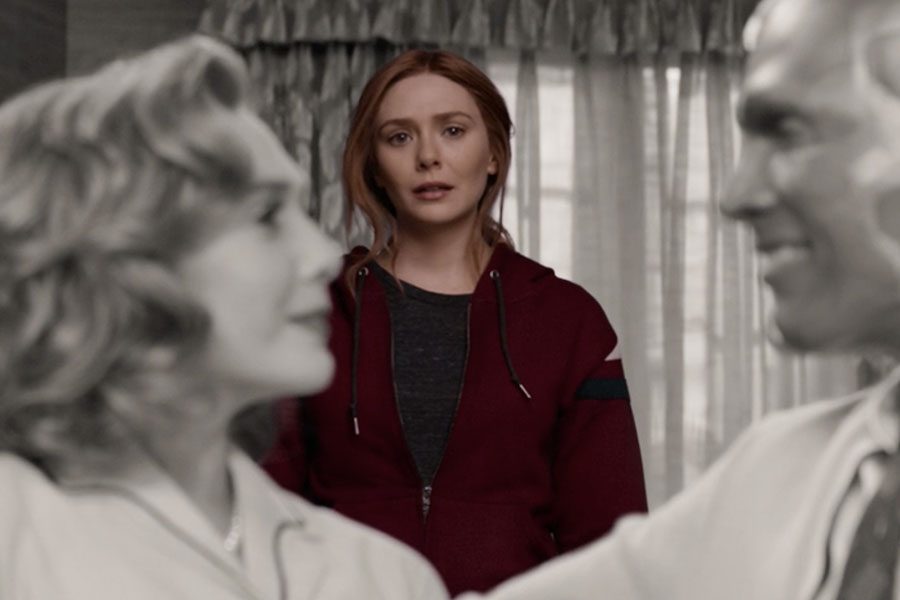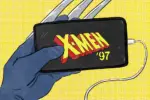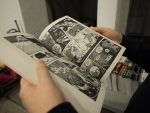Warning to the reader, spoilers for “WandaVision” ahead!
Mystical witches descending into insanity alongside an artificially intelligent robot and a town of mind-controlled people trapped in decades-old sitcoms is not the series fans could have ever expected Marvel to produce, let alone become the No. 1 TV show in the world. However, here we are. “WandaVision” took the world by storm with its 9-episode exploration of Elizabeth Olsen’s Wanda Maximoff character, and as it has reached its conclusion, there is so much to reminisce about.
The series is characterized by its creative risk and its mystery, as each episode left fans with infinite theories about what was to come next. Exciting new characters such as the superpowered Monica Rambeau, Agatha Harkness and the new white variant of Vision made their on-screen debuts in astonishing ways. On top of that, the transformation of the series from a 1950s horror show disguised as a sitcom to a modern Marvel masterpiece compelled its fans and foreshadowed the more risky, artsy future of the Marvel Cinematic Universe (MCU).
These fiery qualities of the series may have slightly blinded fans to the most alluring part of it all: Maximoff’s grief. A superhero’s trauma is usually not taken too seriously, as just about anyone would have to go through some dark times to achieve the ability to fly and shoot lasers out of their eyes. This is where “WandaVision” not only separates itself from other works within the superhero genre but also where a truly cinematic moment is achieved. As mental health becomes more and more of a popular topic, this series’s take on grief has come at a special time. In “WandaVision,” Maximoff’s parents and brother are killed and Maximoff is forced to kill her husband only to have to watch him be brought back to life and killed in front of her again. Fans should be grateful that Marvel’s response to this wasn’t a downplayed, background plotline in somebody else’s film.
Marvel put Wanda Maximoff at the forefront, took a deep and grounded dive into how her devastation has impacted her and established lessons of wisdom about grief that differ from the typical tropes explored within the superhero genre.
“WandaVision” wasn’t about never giving up, it wasn’t about staying strong and it wasn’t about believing in yourself. “WandaVision” was about facing the horror of loss and death, breaking down into smithereens, hurting people in the process of trying to cope and tackling accountability as it’s time to heal. “WandaVision,” ironically enough as it is a series about an alternate existence, is about reality.
Superhero films, specifically in the MCU, rarely touch on these kinds of concepts with this amount of care. Everyone has lost somebody, and Marvel portrays a true healing experience with Maximoff’s evolution into the Scarlet Witch. This was the most fulfilling component of “WandaVision” and serves as a leap forward in the superhero genre and in modern movies in general.
The world’s perception of mental health is still growing. In the midst of a pandemic that has taken so many lives, grief has been something that millions of people have been forced to deal with and somehow move on from. It never seems fair that the world can keep spinning while one can feel so much pain. As contemporary society has never been more compelled to confront the reality of loss, people have collectively realized the importance of mental health and how much there is to heal from. “WandaVision” could not have come at a more perfect time, as this series will touch the heart and perhaps help anybody who may be dealing with loss.
Maximoff is an ultrapowerful character, widely believed to be one of the most powerful beings in the MCU. Similar to the likes of Superman, she rarely faces any kind of issue in defeating her foes. The symbolism of her greatest opponent and the only one she could not annihilate into oblivion being her grief is beyond powerful. There is a humanization of her very inhuman character that allows for millions of viewers to relate to every heartbreaking moment. As Vision says to Maximoff in Episode 8, “What is grief if not love persevering?” This also functions as a brilliant yet simple depiction of the first step of healing: realizing the love that is at the root of this grief. Maximoff eventually comes to appreciate the love she felt and the lessons she learned from Vision and lets him go as she steps back into reality.
Not only does the series portray the bright side of finding light at the end of the tunnel, but it showcases how seriously it takes itself by realistically portraying the nature of grief. In earlier episodes, Maximoff puts people in pain. She forces people to subscribe to the way of life she has designed via her mind control abilities. These people are exempt from their own thoughts and cannot access their own life while trapped in her Hex reality.
This is Maximoff’s selfish and harmful reaction to the terrible losses she has been forced to experience, which resembles just how regular humans without the ability to alter reality react to the same sort of thing. It’s not all sunshine and rainbows. People make mistakes in the face of great pain and traumatic experiences. People say things they don’t mean and do things they wish they could take back. People are people, they are not perfect — not even Maximoff. The pain she inflicts is because of the pain she feels, which is just another lesson to learn about mental health and how the world can simply become happier.
The display of grief throughout “WandaVision is more powerful than just existing as a key puzzle piece of the MCU’s future — it is a piece of wisdom worthy for everybody to absorb. Elizabeth Olsen’s performance is more than immaculate; it is Emmy-worthy as she captures the downfall and triumph of grief in a masterful way. The MCU is more than just cool-looking superheroes with colorful abilities beating up bad guys. It can be a soulful story of overcoming some of humanity’s darkest demons.

















